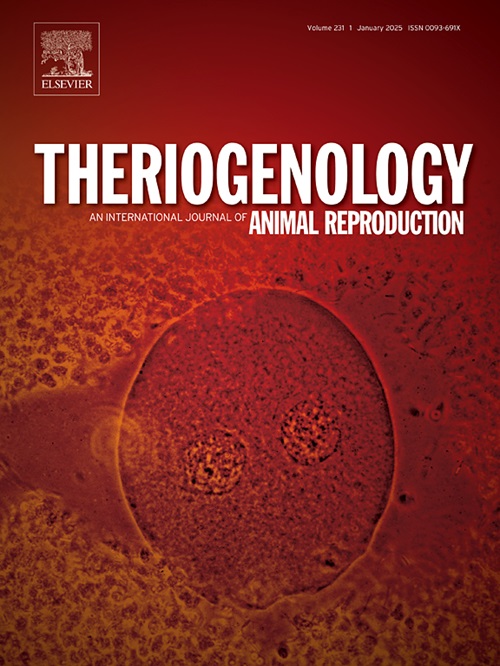Fertility with cervical insemination and boar effects using hypothermic stored semen
IF 2.4
2区 农林科学
Q3 REPRODUCTIVE BIOLOGY
引用次数: 0
Abstract
Cold-storage of semen at 5 °C ± 1 °C provides a novel approach for counteracting antimicrobial resistance in artificial insemination (AI) of pigs. The first objective was to test the suitability of an AI boar population for cold semen storage. The second goal was to test cold semen storage in sow farms using the traditional cervical insemination (CAI) technique. For Experiment 1, semen from four repeated ejaculates of 20 AI boars was stored for 144h at 5 °C in AndroStar® Premium (APrem) and at 17 °C in Beltsville Thawing Solution (BTS). Sperm kinematics and acrosome integrity were assessed to identify inter- and intra-boar variability in sperm quality traits. All 80 semen samples met the minimum requirements for use in AI after long-term storage. Two boars demonstrated lower motility in 5 °C semen doses compared to 17 °C (p < 0.05). Intra-boar variation, analyzed as a coefficient of variance, was low in both semen storage groups. For Experiment 2, semen aliquots stored at 5 °C in APrem and at 17 °C in BTS were used for CAI of 579 sows in two farms under routine AI management conditions. Non-return rates, farrowing rates, and litter sizes were high in both farms and did not vary between the two semen storage groups (p > 0.05). In conclusion, the hypothermic semen storage concept is applicable with CAI and the use of relatively low sperm numbers. The in vitro data suggest a broad suitability of AI boars for semen storage at 5 °C.
求助全文
约1分钟内获得全文
求助全文
来源期刊

Theriogenology
农林科学-生殖生物学
CiteScore
5.50
自引率
14.30%
发文量
387
审稿时长
72 days
期刊介绍:
Theriogenology provides an international forum for researchers, clinicians, and industry professionals in animal reproductive biology. This acclaimed journal publishes articles on a wide range of topics in reproductive and developmental biology, of domestic mammal, avian, and aquatic species as well as wild species which are the object of veterinary care in research or conservation programs.
 求助内容:
求助内容: 应助结果提醒方式:
应助结果提醒方式:


